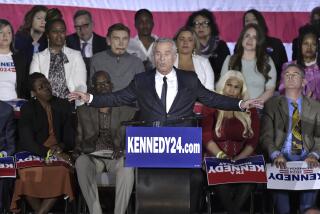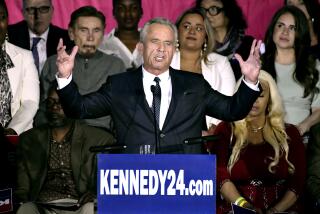Obama connects from on high, online
WASHINGTON AND LOS ANGELES — It started with the YouTube presidential debates, Saturday-morning Internet addresses to the nation, and the Barack Obama Facebook page and Twitter feed.
On Thursday, the president took another step in embracing the power of technology -- hosting a virtual town hall that elicited more than 104,000 questions and drew 3.6 million votes to determine which the president would answer.
In the end, given that the questions were vetted by the White House, it felt about as spontaneous as an infomercial.
But that was not the point.
The voting aspect of the event -- an idea made popular by websites such as Digg and Reddit -- drove hordes to the White House website, fostering a connection with the public that presidents have long sought.
“People are sitting down and engaging,” said Macon Phillips, Obama’s director of new media. “When you have that many people, think of the distributive brainpower. People are coming together to collaborate.”
Andrew Rasiej, whose blog TechPresident.com monitors the intersection of politics and the Web, added: “It’s a baby step, but a significant one nonetheless.”
Beginning early in the presidential campaign, the Obama team showed a willingness to test elements of new media, including online video, e-mailing, social networking and micro-messaging (a la Twitter).
The technology, harnessed to turn out voters and spread Obama’s message, let grass-roots supporters engage daily.
But maintaining that participation in the White House has been difficult. It’s a problem that presidents have encountered before but haven’t been quite able to solve.
In March 1977, President Carter took 100 phone calls from across the country. Event host Walter Cronkite called it “a new approach to communication between the president and the people of the United States.”
The calls were not screened in any way. Which led to such less-than-scintillating exchanges as:
Caller: Good afternoon, Mr. President.
Carter: Good afternoon.
Caller: How are you?
Carter: Fine.
Nine million calls jammed CBS’ switchboards.
Bill Clinton was the first president to venture online to engage the public, conducting a 100-minute Internet chat in 1999. Despite technical glitches, he managed to answer 19 questions from people all over the world.
Obama’s town hall Thursday borrowed a stratagem well-known to the producers of “American Idol” and “Dancing With the Stars”: To build an audience, get people to participate -- even if only in a small way, voting for favorites.
The White House used a question-and-answer platform called Google Moderator, originally created by the Internet search giant so that its more than 20,000 employees could vote on what to ask company founders and executives.
“It’s a fantastic way to get real-time input and have the crowd prioritize the questions,” said Vic Gundotra, a vice president of engineering at Google. “But what do you do when the White House wants to use it?”
What Obama had to say Thursday about the economy, education and healthcare was nothing new. He has gone over his plans for the nation several times since his inauguration.
Which may be why at 9 a.m. in the airy lobby of USC’s Annenberg School for Communication, a dozen students who were sprawled on armchairs or sitting at tables barely seemed to take note. A wall was filled with TV screens, but only one was showing Obama holding forth.
“They’ll probably be playing it on repeat at CNN,” said Susy Garcia Salas, 26, a conference coordinator who recently graduated from the communications school. “I might go look for the highlights online.”
One question that seemed to get some traction was about legalizing marijuana. (It was one of 2,139 such questions submitted.)
“I don’t know what this says about the online audience,” Obama said, smiling as the crowd at the White House laughed.
“This was a fairly popular question; we want to make sure that it was answered. The answer is no, I don’t think that’s a good strategy to grow our economy.”
Blogger Rasiej said the administration’s idea was “to try to create an ecosystem of dialogue.”
USC communications major Laurel West, 20, said: “I like that they’re trying to get people more involved with the process.
“But I’m not sure about its effectiveness.”
She said she didn’t have time to watch.
On Twitter, 26-year-old J.C. Lee -- a Berkeley playwright and Future Leaders Institute director -- said: “There’s something transformative about this presidency when you see this sort of online forum.
“The office will never be the same.”
But was the event truly engaging the public, or only creating an illusion of doing so?
Sable Manson, 22, a USC graduate student who was hanging out at a Starbucks near school, said she appreciated Obama’s town hall as “a sign of the times” but just wasn’t sure everyone could participate in government at an intimate level.
“Who’s really going to be answering those 100,000 e-mails?” she said. “It’s headed in the right direction, but it’s not perfect.”
--
david.sarno@latimes.com
Times staff writers Jia-Rui Chong and Joanna Lin in Los Angeles and Christi Parsons in our Washington bureau contributed to this report.






